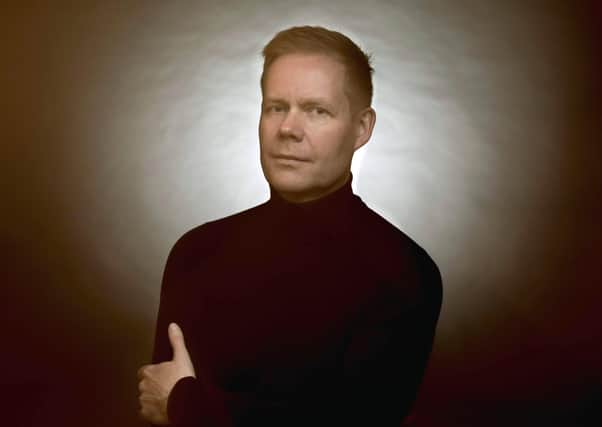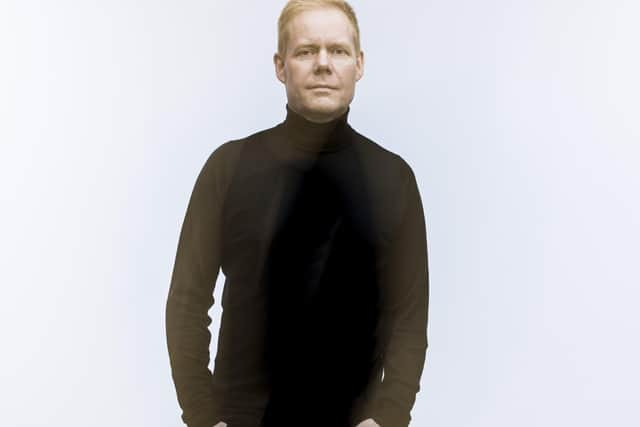Max Richter: ‘Human rights are the bedrock of civilisation’


Initially prompted by the controversy surrounding the US incarceration of alleged war criminals at Guantanamo Bay, Richter composed a short piece called Mercy but an expanded choral work, featuring dozens of voices, took years to realise. Finally, 72 years on from the adoption of the Declaration by the United Nations General Assembly, it has found its time and place.
In challenging times, he feels the Declaration, although not perfect, is a document that represents an “inspiring vision for the possibility of a better and kinder world”. He wanted his album, Voices, to be “a place to think and reflect”.
Advertisement
Hide AdAdvertisement
Hide Ad“I wanted to make a piece which wasn’t about the problems but was about the potential solutions, so something hopeful,” explains the 54-year-old, who is one of 21st century classical music’s best-selling composers. “The more time I spent thinking about the Declaration, the more I felt while it isn’t a perfect document, it is a document 70 years old, but it feels nevertheless something very hopeful and about the future.”
Among the 70 or so voices on the record are Eleanor Roosevelt, the longest-serving First Lady of the United States and prominent activist, and the American actor Kiki Layne. “What a force of nature that woman was,” Richter says of Roosevelt. “She achieved incredible things and basically got the Declaration written one way and another. Then you have Kiki Layne whose voice I heard in If Beale Street Could Talk, it’s a film that she narrates and she has a young voice, I wanted her voice to be about the future.”
The rest of the readings were crowd-sourced. “We thought about that really as a way to embed the idea of universality and the democratic into the structure of the piece,” Richter says. “That was in a way relatively simple. We just put the call out on social media and hey presto, hundreds of recordings. That people responded so warmly and generously to that in a way attests to the fact that this text means a lot to people, that was wonderful.”
With basic human rights currently under threat in places like Hong Kong, Syria and Myanmar, the timing of this album seems apposite. Yet Richter says he did not intend to make a political point. “I don’t think of it as a political statement because I think human rights are not political, in a sense. They are more fundamental than that. They are the bedrock really of civilisation, that’s what it is, the fundamental of how people should relate toward one another on a one-to-one basis and how we should view one another, and that’s what I like so much about the Universal Declaration.
Advertisement
Hide AdAdvertisement
Hide Ad“It isn’t political, it’s a humane document about how we should treat one another, and it’s also something which I think accords with our sense of natural justice. Even children would recognise the principles of the Declaration, ‘all people should be born and treated equal’, all of this stuff, it’s fundamental and it goes beyond politics. I think that’s what’s so beautiful about it.”


Richter utilised an ‘upside down’ orchestra on the recording, including 12 double basses, 24 cellos, six violas, eight violins and a harp. “The standard orchestra is in a way a microcosm of how people thought society should be built in the 18th and 19th centuries. There’s a man standing at the front telling everyone what to do. I felt that this was an opportunity to subvert that and again embed the democratic into the piece by just shuffling that.
“The other thing I wanted to do is reflect my sense that the world has been turned upside down in the last ten years or so actually in the sound itself, in the DNA of the material, so basically it’s almost all bass instruments, it’s basses and cellos rather than upper strings and high melody instruments. The other thing about that is it’s a metaphor, it’s about elevating something out of the dark material. That is the world we’re living in right now, we’re facing huge challenges, socially, politically, environmentally, in terms of technology, in terms of economics. It feels like the fire is burning everywhere at the moment; nevertheless these problems are human problems, we made them. This is the idea really that we can also solve them. After all, we always have choices, we just have to make the right decisions.”
There’s an optimism at the heart of Voices, he says. “I hope so because while it’s true that we’re in a terrible mess in all kinds of ways, there is also an increasing awareness that things can’t go on the way they are. I think there is an activist spirit especially among younger people which is very encouraging on the climate side, if we think about the Black Lives Matter movement in the States, all kinds of fundamental, grassroot-y activist stances that are starting to happen, and that is hopeful.”
Advertisement
Hide AdAdvertisement
Hide AdThe work premiered at the Barbican in London, with visuals by Richter’s partner, filmmaker Yulia Mahr, shortly before the lockdown. “That was amazing,” Richter says. “Writing a piece of music is really proposing a theory until you put it in front of an audience and it was extraordinary. Again, I think the texts have a real effect on people. We all know about the Universal Declaration but we don’t spend time with a text like that. You sort of roughly know what’s in it but for people to actually hear those words, and for the players to be living with that material and then the audience to encounter it, it was tremendously powerful. I’ve never felt a vibe like that in a concert hall, it was an extraordinary thing and we were very lucky in that timing-wise we had the opportunity to play the two shows and then record the piece then pretty much it was lockdown straight away.”
Other concerts he had planned have fallen foul of the pandemic. “Music is a community activity, so it’s sad, it’s depressing that we haven’t been able to play it,” Richter says. “From my own personal standpoint, I’m very lucky in that the bulk of my life is not performing, it’s writing. Obviously for my colleagues and friends who are players, in bands or in orchestras, it’s devastating. I think we’re generally feeling the loss of live music quite profoundly.
“In a way it’s a chance to remember the stuff that is really important to us, and I think one of the things that’s come out of the pandemic is that people can go, ‘Hang on, I really like culture, I really like going to a museum or a gallery or a cinema or a concert’, these things matter to us because they are part of what makes us human. Culture is an important part of society and it’s an important part of us figuring out how we live in the world. It’s been horrible not being able to play, and obviously we will as soon as we can, but I don’t think it’s going to be soon.”
As well as the album, Richter is launching a new app based on his monumental eight-hour work Sleep, which enables users to create personalised musical sessions for a chosen period, with planetary animations programmed to Sleep’s musical themes. “It’s taken a long time for the technology to be ready for it,” he says. “I didn’t just want to do an app, it would make no sense to me until it could be artistically valid. The thing about Sleep is it’s a piece with a strong utility component, it’s music as a tool and I’m very interested in extending that utility into the personal, so rather than it being a hard-wired piece of architecture eight hours long, the algorithmic aspect of the app allows the piece to be architecturally right as it were at any length, so people can say, ‘I want a three-hour or two-hour or six-hour Sleep’ and the music will still make sense, which is really important for me.
Advertisement
Hide AdAdvertisement
Hide Ad“I really like that, it feels like it’s an increasing democratisation of that material. Obviously I wrote the piece to be listened to or to be experienced while sleeping but people use that music in all kinds of ways, so it extends the potential for that.”
Voices it out now on Decca Records. www.maxrichtermusic.com
Comment Guidelines
National World encourages reader discussion on our stories. User feedback, insights and back-and-forth exchanges add a rich layer of context to reporting. Please review our Community Guidelines before commenting.